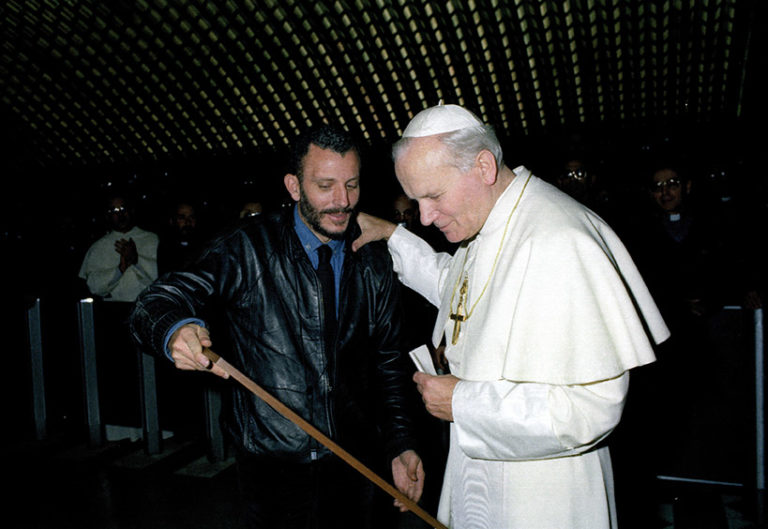Special audience at the “Penance and Reconciliation” congress February 10, 1983
St. John Paul II
Rome, Paul VI Hall, February 10, 1983
Sixty bishops and about two thousand priests, many of them parish priests, coming from some of the most diverse parts of the world, attended a meeting with the Pope in the Paul VI hall of the Vatican. They had all taken part in an assembly that began in Rome on the 7th to study the topic of next Synod of Bishops: “Reconciliation and Penance in the life of the Church”. The Secretary General of the Synod, Archbishop Mgr. Josef Tomko opened the meeting with a relationship from the base. The assembly had been organized by the Neocatechumenal Communities that exists in already 2,200 parishes in 502 dioceses and 70 nations. At the beginning of the audience, a bishop and some priests introduced on that day to John Paul II a synthesis in the afternoon with a Eucharistic concelebration. The initiator of this ecclesial experience called “The Neocatechumenal Way”, Kiko Argüello, presented to the Holy Father the collaborators, and the Pope gave the following speech:
1. I am happy to have the opportunity today to meet a group of members of the Neocatechumenal Communities gathered in Rome to meditate together on Reconciliation and Penance in the mission of the Church, which is the theme of the next Synod of Bishops. I greet the bishops, pastors and priests here present, who have come from all the continents for this occasion. I would like my words to be a reflection on the spiritual and ecclesial experience which you intend on doing, that they may be for you an incentive towards an ever greater commitment in offering, within the context of the modern world, a clear and genuine example of profound Christian faith, lived constantly in intimate, docile and happy union with the pastors of the Church.
Your witness is meant to be fundamentally one of announcing the Gospel message, which has as its center the proclamation that Jesus of Nazareth is the Messiah, the Lord, the incarnate Son of God, who died and rose again for our salvation. Evangelization – said Paul VI – will always contain – as the foundation, center and the same time summit of its dynamism – a clear proclamation that in Jesus Christ, the Son of God made man, who died and rose from the dead, salvation is offered to all men, as a gift of God’s grace and mercy (Apostolic Exhortation Evangelii Nuntiandi, 37). One of the typical manifestations of your communities is precisely the evangelization carried out in countries and environments which have either never heard the Christian message or have become almost deaf to this message, because of the prevalence of ideologies, concepts, of refusal or indifference to the ‘problem of God’ itself. This is why you intend to prepare and train catechists, who will have to strive first of all to study thoroughly and live personally the mystery of Christ. “Catechising”- I wrote in the apostolic exhortation about catechesis in our time – “is, in a certain way, to lead a person to study this mystery in all its dimensions … to reveal in the Person of Christ the whole of God’s eternal design which is fulfilled in him … The definitive aim of catechesis is to put people not only in touch but in communion, in intimacy, with Jesus Christ: only he can lead us to the love of the Father in the Spirit and make us share in the life of the Holy Trinity” (Apostolic Exhortation, Catechesi Tradendae, 5).
I have made note of the commitment of your communities in the praiseworthy work of the catechesis. During these years, the Episcopal Conferences have intensified their efforts in this exceptionally important field for the very life of the People of God. To follow the methods, the indications, the routes, the texts, offered by the Episcopates, and to also exercise the ministry of catechesis within the communion and ecclesial discipline, regarding the fundamental ministry of the bishop and of his associated priests, will be a precious help for your catechesis on all levels and it will certainly produce great spiritual fruits among the faithful. The specific end of every work and form of catechesis will be that of making the seed of faith, deposited by the Holy Spirit with the first announcement and effectively transmitted through Baptism, germinate, grow, and develop.

2. Not only at a theoretical level, but in a special way in its vital dimension, you want to deepen in your communities the meaning, value, richness and demands of Baptism, the sacrament which is a necessary condition for salvation, which unites the death, burial and resurrection of the Savior, makes one live the same life as Christ and which makes the baptized person a temple of the Spirit, adopted son of the Heavenly Father, a brother and heir of Christ and member of the Body of Christ, which is the Church. This enrichment must be guided to rediscover and evaluate the riches proper to Baptism, received normally in infancy, and to which it is therefore necessary to refer to, not as a purely juridical fact, but as a true moment in which the whole Christian life is founded. Cultivating what we could call ‘baptismal spirituality’, you want to animate, direct and enrich your journey of faith as a logical development to the intrinsic demands of the sacrament, so that your testimony can be always more authentic, sincere, consistent and effective, and be always more disposed and willing to the divine call.
Such readiness must be manifested in the continual meditation on and attention to Sacred Tradition and Sacred Scripture, which form “one sacred deposit of the Word of God, which is entrusted to the Church” (Dogmatic Constitution Dei Verbum, 10). From this follows the need for a constant and serious work of personal and community investigation of the Word of God and of the teaching of the Magisterium of the Church, through participation in serious biblical and theological courses. Such a commitment to study and reflection is shown to be more than ever necessary for those who, having to fulfil the role of catechist, have the duty to feed their brothers and sisters with solid spiritual food. Always keep in mind the solemn and strong statement of the Second Vatican Ecumenical Council: “The Church has always venerated the divine Scriptures just as she venerates the Body of the Lord, since, from the table of both the Word of God and of the Body of Christ she unceasingly receives and offers to the faithful the bread of life, especially in the Sacred Liturgy” (Dogmatic Constitution Dei Verbum, 21).
From Christ the Word to Christ the Eucharist, because the Eucharistic Sacrifice is the source, the center, the culmination of the whole Christian life. Celebrate the Eucharist and, above all, Easter, with true piety, with great dignity, with love for the liturgical rites of the Church, with precise observance of the norms established by competent authority, with the desire for communion with all the brethren.
3. Likewise, your willingness to respond to the divine call must be manifested in continual, tireless, daily prayer, a special expression of adoration which man, fragile, weak and aware that he is a contingent creature, offers to God, the Transcendent, the Infinite, the Omnipotent, the Creator, but also the loving and merciful Father; prayer that then also becomes an intimate and affectionate dialogue between Father and Son. Prayer which becomes the suppliant chorus in the Pater Noster, taught to us by Jesus himself: prayer which becomes the solemn and conscious profession of Christian faith in the Apostolic Creed or Symbol; prayer which finds in the Psalms the various and complex inner nuances with which the one who is praying – the People of the Promise, the new Chosen People, the Church, the Christian in various spiritual situations – can turn to God, his hope, his rock, his salvation. “If the Psalm prays,” St Augustine suggests to us, “pray; if it laments, lament; if it exults, exult; if it hopes, hope; if it fears, fear. All the things which are written here are your mirror” (Enarr. in Ps. XXX,Il, s.III, J: CCL 38, 213).
4. Your willingness to respond to the divine appeal is manifested in fulfilling, day after day, the compelling word of Jesus: “Turn away from sin and believe in the Good News” (Mk 1: 15). This conversion, this “change of mentality”, is above all the rejection of true evil, sin, which draws us away from God. This conversion is a continuous journey of return to the house of the Father, like the return of the prodigal son (cf. Lk 15: 11-32). This conversion finds its salvific sign in the sacrament of Penance or Reconciliation. “Freedom from sin”, I wrote in the Bull of Indiction of the Jubilee for the 1950th Anniversary of the Redemption, “is … a fruit and primary requirement of faith in Christ the Redeemer and faith in his Church … At the service of this freedom, the Lord Jesus instituted in the Church the Sacrament of Penance, so that those who have committed sin after Baptism may be reconciled with God, whom they have offended, and with the Church which they have wounded” (Bulla Aperite Portas, 5).

The ministry of reconciliation – this wonderful gift of the infinite mercy of God – is entrusted to you priests. Be ministers who are always worthy, ready, zealous, available, patient, serene, following with faithful diligence the norms established in this matter by ecclesiastical authority. The faithful will thus be able to find in this sacrament an authentic sign and instrument of spiritual rebirth and of interior freedom overflowing with joy. And all of you, brothers, celebrate the Sacrament of Reconciliation with great confidence in the mercy of God, in full adherence to the ministry and discipline of the Church as repeatedly recommended by the new Code of Canon Law, for the pardon and peace of the disciples of the Lord, and as the efficacious announcement of the Lord’s goodness to everyone.
5. Along your spiritual journey, try to harmonize the requirements of the catechumenate with the commitment to the necessary dedication to the brethren, to the family, to professional and social duties. Above all, do not yield to the temptation to close yourselves in on yourselves, isolating yourselves from the life of the parochial or diocesan community, since only from an effective insertion in those larger organisms can your apostolic commitment draw authenticity and effectiveness. l do not want to conclude these reflections of mine without reminding you and the communities you represent of what I said recently on the occasion of the official presentation of the New Code of Canon Law: the Christian must prepare his own soul to welcome it and to put it into practice. Laws are a generous gift of God and their observance is true wisdom. The law of the Church is a means, an aid, and also a protection for keeping in communion with the Lord. Therefore the juridical norms, just as the liturgical ones, have to be observed without negligence and without omission. I am sure that your Communities, moved by the fervor to distinguish themselves in the celebration of Baptism, the Eucharist and Penance, also want to distinguish themselves, under the Church’s guidance, in this commitment of fidelity to common discipline.

Dearest Brothers:
While I offer these thoughts of mine for your reflection, I ask the abundance of divine grace upon you here present, and on all the communities which you represent. I entrust everyone to Mary Most Holy, incomparable example of ardent faith and docile acceptance of the will of God. May she who “advanced in her pilgrimage of faith and loyally persevered in her union with her Son unto the cross” (Lumen Gentium, 58) comfort you with her maternal smile in the daily pilgrimage of the following of Christ. With my Apostolic Blessing.